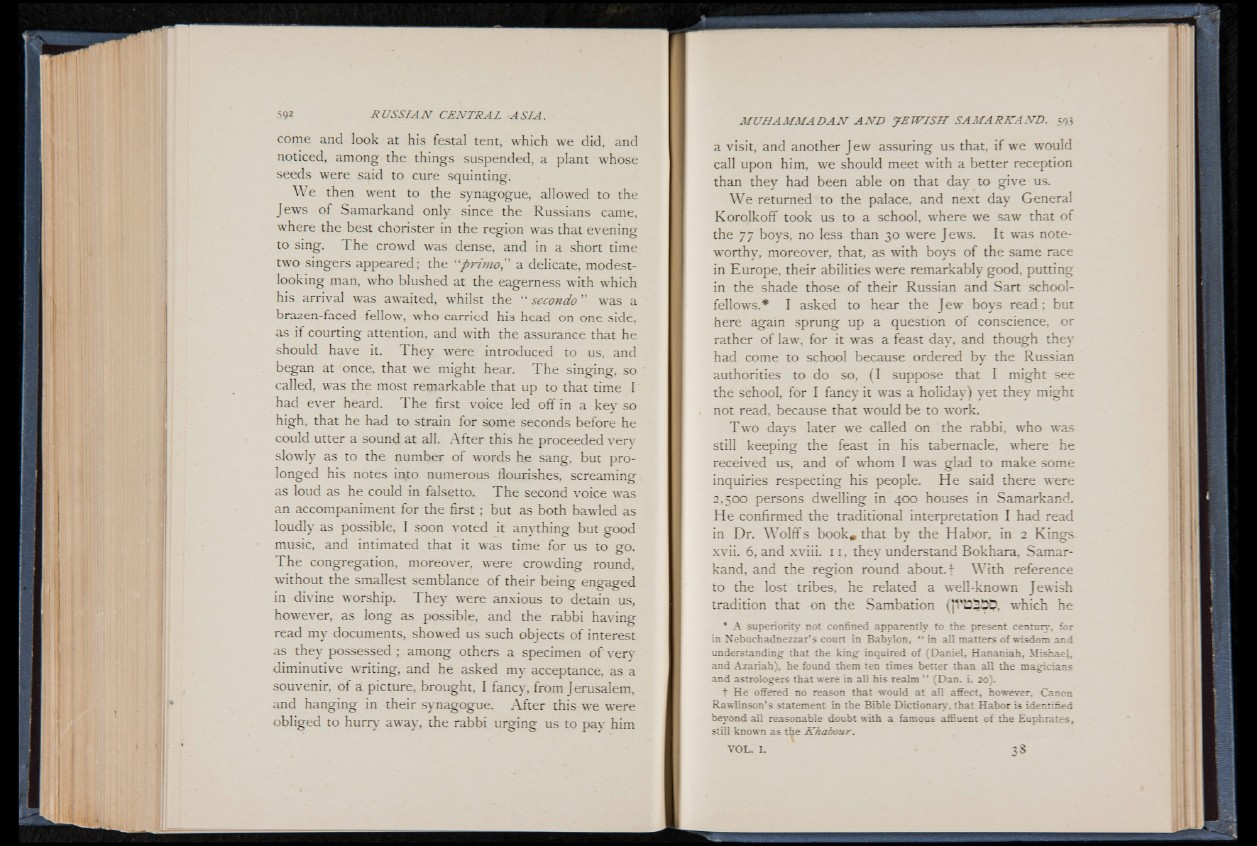
come and look at his festal tent, which we did, and
noticed, among the things suspended, a plant whose
seeds were said to cure squinting.
We then went to the synagogue, allowed to the
Jews of Samarkand only since the Russians came,
where the best chorister in the region was that evening
to sing. The crowd was dense, and in a short time
two singers appeared; the “primo,” a delicate, modest-
looking man, who blushed at the eagerness with which
his arrival was awaited, whilst the “ secondo" was a
brazen-faced fellow, who carried his head on one side,
as if courting attention, and with the assurance that he
should have it. They were introduced to us, and
began at once, that we might hear. The singing, so
called, was the most remarkable that up to that time I
had ever heard. The first voice led off in a key so
high, that he had to strain for some seconds before he
could utter a sound at all. After this he proceeded very
slowly as to the number of words he sang, but prolonged
his notes into numerous flourishes, screaming
as loud as he could in falsetto. The second voice was
an accompaniment for the first ; but as both bawled as
loudly as possible, I soon voted it anything but good
music, and intimated that it was time for us to Ogo
The congregation, moreover, were crowding round,
without the smallest semblance o f their being engaged
in divine worship. They were anxious to detain us,
however, as long as possible, and the rabbi having
read my documents, showed us such objects of interest
as they possessed ; among others a specimen o f very
diminutive writing, and he asked my acceptance, as a
souvenir, o f a picture, brought, I fancy, from Jerusalem,
and hanging in their synagogue. After this we were
obliged to hurry away, the rabbi urging us to pav him
a visit, and another Jew assuring us that, if we would
call upon him, we should meet with a better reception
than they had been able on that day to give us.
We returned to the palace, and next day General
Korolkoff took us to a school, where we saw that of
the 77 boys, no less than 30 were Jews. It was noteworthy,
moreover, that, as with boys o f the same race
in Europe, their abilities were remarkably good, putting
in the shade those of their Russian and Sart schoolfellows.*
I asked to hear the Jew boys read; but
here again sprung up a question o f conscience, or
rather of law, for it was a feast day, and though they
had come to school because ordered by the Russian
authorities to do so, (I suppose that I might see
the school, for I fancy it was a holiday) yet they might
not read, because that would be to work.
Two days later we called on the rabbi, who was
still keeping the feast in his tabernacle, where he
received us, and o f whom I was glad to make some
inquiries respecting his people. He said there were
2,500 persons dwelling in 400 houses in Samarkand.
He confirmed the traditional interpretation I had read
in Dr. Wolff s book* that by the Habor, in 2 Kings * J 1 o
xvii. 6, and xviii. 11, they understand Bokhara, Samarkand,
and the region round about, f With reference
to the lost tribes, he related a well-known Jewish
tradition that on the Sambation (p*t22i2D, which he
* A superiority not confined apparently to the present century, for
in Nebuchadnezzar’ s court in Babylon, " in all matters o f wisdom and
understanding that the kin g inquired o f (Daniel, Hananiah, MishaeJ,
and Azariah), he found them ten times better than all the magicians
and astrologers that were in all his realm ” (Dan. i. 20).
f He offered no reason that would at all affect, however, Canon
Rawlinson’ s statement in the Bible Dictionary, that Habor is identified
beyond all reasonable doubt with a famous affluent o f the Euphrates,
still known as the Khabour.
VOL. I. 3 8